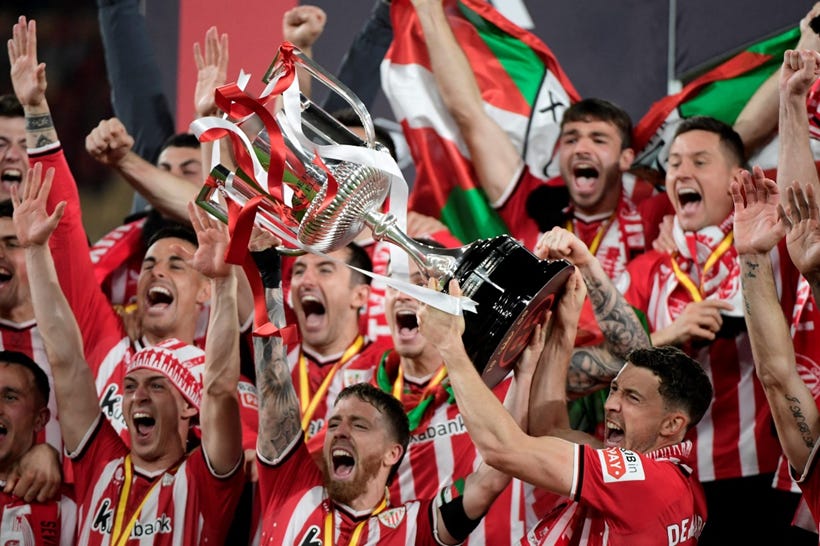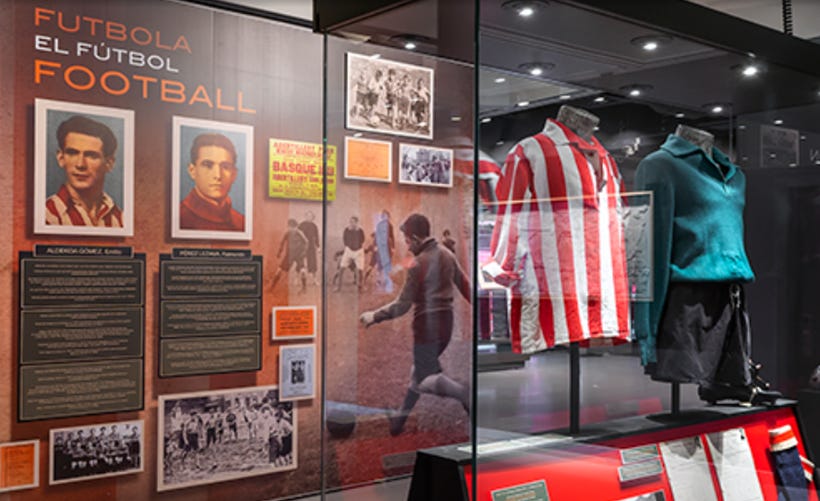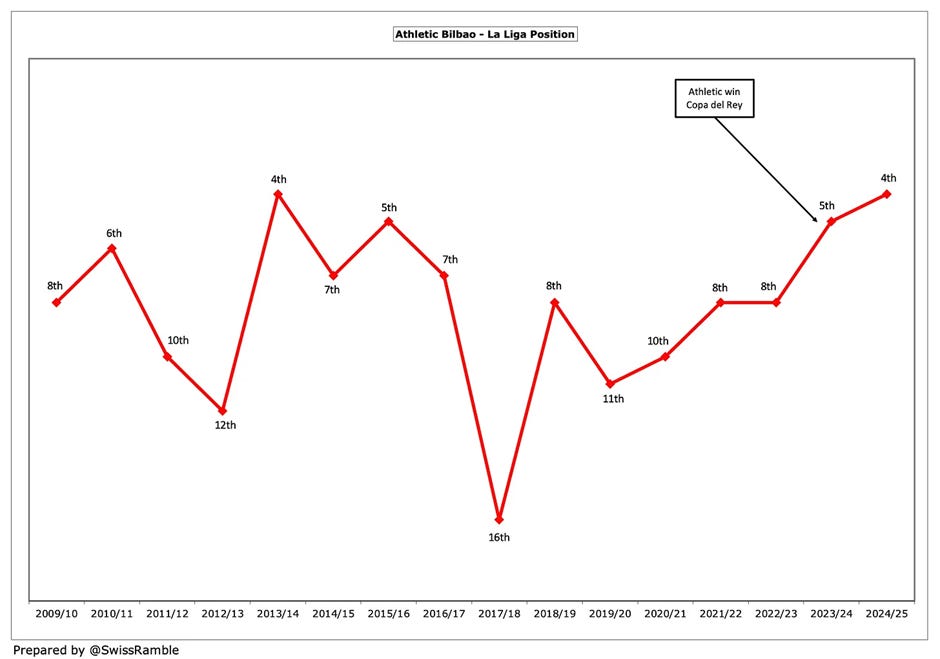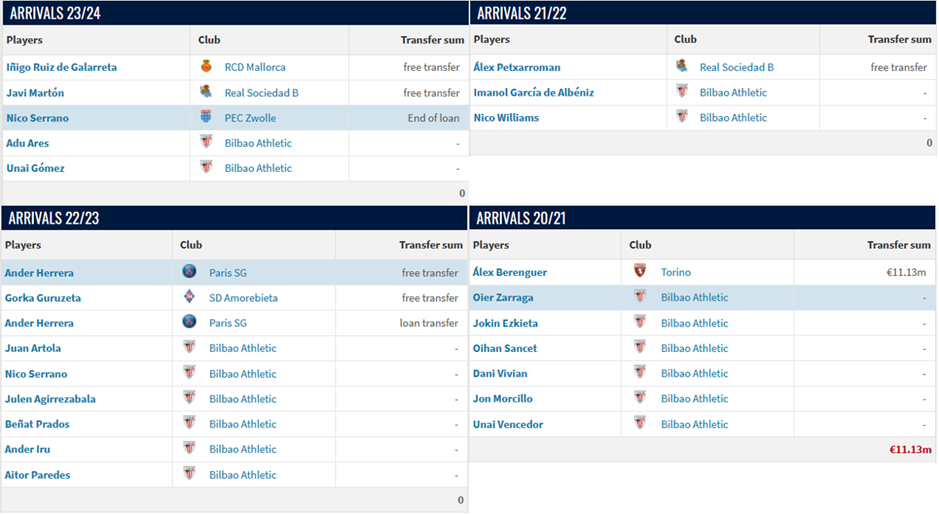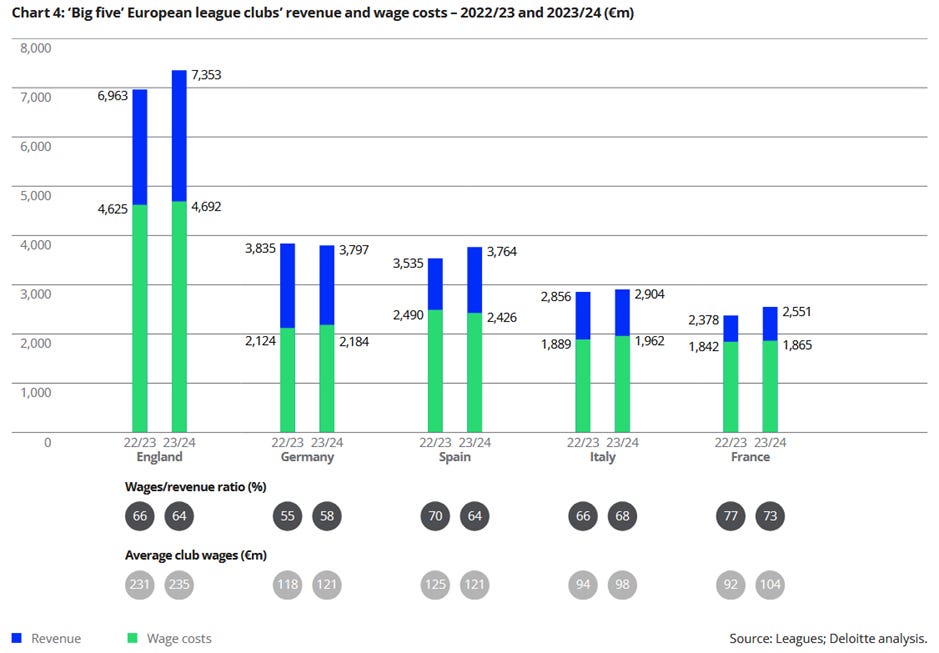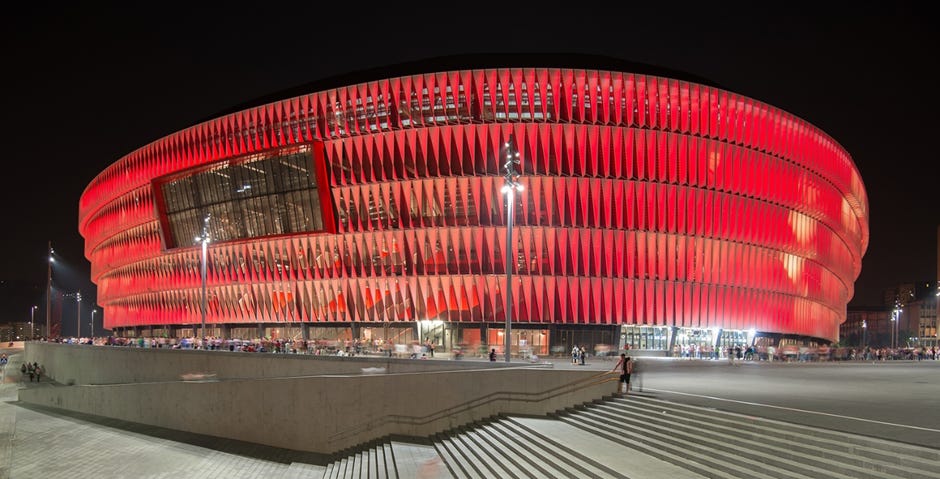Maybe there is another way after all
With European football seemingly in a bubble, growing financialization of the sport and disconnect between club owners and local communities, one club shines bright.
Welcome to my inaugural newsletter. I will be sharing my thoughts about investing in sports, private equity and other topics close to my heart.
When Alex Berenguer smashed the penalty at 1am in the morning in front of the packed stadium in Seville, it sent thousands of fans in ecstasy. It also gave football fans around the world a hope. Athletic Bilbao had won the 2024 Copa del Rey final to end 40-year trophy drought.
One of the most unique clubs in the world, Athletic is a polar opposite of modern football clubs operating as a globalised big business. Member-owned, debt-free, and anchored in a century long policy of playing only players that were either born or brought up in the Basque country.
And now it has lifted major trophy again. In the industry dominated by the US and petro-states money, MCOs and financial shenanigans; maybe there is another way after all…
Beginnings – English connection and early glory
Athletic was founded in 1898 by a group of Basque students educated in Britain, where they discovered and fell in love with football. At the time Bilbao was a burgeoning industrial town, and home to many English workers, who brought with them football.
Athletic had won the inaugural Copa del Rey in 1903, and is one of only three founding teams of the La Liga that have never been relegated (Real Madrid and FC Barcelona being the other two). It is the fourth most successful club in Spain, with 8 titles and 24 cup wins, although many of them won in the early days.
Community and political representation
Athletic is arguably the strongest Basque symbol in the world, and so the club’s essence is as political as it is sporting. It may be the only professional sports team to whom its philosophy and representation are more important than winning record and profits.
The club stands out because unlike most professional sports teams, its squad reflects the local community – literally. About 80% of the first team players are local kids coming from the club’s youth system.
A vast majority of Athletic’s supporters think the club’s values are more important than its material success on the pitch. This connection between the club and community was encapsulated on the club’s 100th year anniversary, when former Athletic president Jose Maria Arrate said: Athletic Bilbao is more than a football club, it is a feeling.
Members owned
Athletic is one of just four clubs in Spain that is still owned and operated by its members, the others being Barcelona, Real Madrid and Osasuna. This acts to shield the club from financial investors.
As of mid-2024, the club had 43,649 members, who elect the board and president. Decision making takes place through democratic structures, including an assembly of members.
Kids will be alright - the Cantera policy
Per the Athletic’s website: The club’s sporting philosophy is governed by a code which states that Athletic Club may only field players who have come through its own academy or the academies of other clubs in the Basque Country, or players who were born in the following territories which constitute the Basque Country.
Since 1911, Athletic has played exclusively with players meeting its criteria to be deemed Basque (criteria has been relaxed over time). It is certainly a unique policy for a professional team in the modern age. But in La Liga’s inaugural season in 1928, half of the La Liga teams were from the Basque country, so cantera policy was not very punitive.
La cantera philosophy has gained Athletic many admirers, but it also attracted critics. It is controversial, both politically and in terms of its sporting effectiveness. Antonio Camacho, author of book on Athletic Bilbao and its identity, notes: “Athletic’s project is not to try to be in European football’s super-oligarchy, and it is a realistic alternative.”
Now, how many fans around Europe could identify with such goal? Quite a few, I would say.
Relying strictly on local talents in European football though is almost suicidal. One local trade union organiser and a passionate Athletic supporter, argues otherwise: “On the contrary, the sporting dimension is also strengthened by the youth policy, as it makes the first team players feel more identified with the club and compete in a different way.”
A key part of the academy player development is teaching young players about Basque history, culture, and instilling a sense of pride and responsibility. In sports, more than in any other walk of life, passion and intrinsic motivation create a competitive advantage.
What matters the most is how Athletic’s fans feel about the club’s philosophy. 76% of them said that they would rather see Athletic relegated to the Second Division than allow the club to give up the tradition of la cantera. Debate settled…
On the pitch – not an underdog
Before winning the Spanish Cup in 2024, Athletic’s last major trophies were in 1983 / 84, when they won a double. Since then, across four decades they lost in five consecutive cup finals.
Despite self-imposed restriction, Athletic has been one of the stronger teams in Spain. Last season they finished 4th in La Liga, qualifying for the Champions League. They have qualified for the European competition in 8 of the last 15 seasons.
Business model shaped by philosophy, not the other way around
Athletic’s ownership structure, and la cantera policy has strongly shaped its finances and business model. The club operates differently from most clubs in top 5 leagues, which spend heavily on player transfers and international stars. It is fair to say that Athletic is not the most lucrative target for football agents.
With very little money spent on transfer for players from around the world, the club is able to invest heavily in youth development and facilities. Athletic has the most players in La Liga in the first-team who were developed through the youth set-up, famous Lezama academy – 18 first team players.
To be clear, Athletic is not a poor club, nor is Bilbao a deprived town. On the contrary, Athletic is among the wealthier clubs in Spain (and with that in Europe too), and Bilbao is a prosperous industrial town.
In the 2023/24 season the club generated €124.5m in revenues, growing to €150.5m in 2024/25. Most of this revenue uplift is from the Europa League, after six seasons without playing in Europe. In the newly started season Athletic is playing in the Champions League, which will drive revenues further.
As expected, broadcasting rights are the biggest revenue contributor, accounting for over ½ of all revenues – €68m (23/24), growing to €74.4m (24/25). Income from memberships and subscriptions is ~€26m per season, more than what some teams in the EFL Championship make in an entire season.
Loyalty has its price
The Cantera policy means that the club spend marginal amount on player transfers and agents. From 2019 to 2024 Athletic had paid transfer fee for only one player, Alex Berenguer (€11m in 2020) who scored a winning penalty in the 2024 Spanish cup final.
Historically Athletic’s best players were less likely to engage in forcing transfers out of the club. This is no surprise, local lads are hesitant to engage in shenanigans, like Isak at Newcastle. For most clubs keeping its top players can be a difference between success and failure. When a player does leave, the club commands high transfer fees, like with Javi Martínez (Bayern Munich) and Kepa Arrizabalaga (Chelsea).
There is another side to the Cantera policy. Given that the club is barely spending anything on transfers, it has more money available to spend on player wages. Couple that with a strongly entrenched philosophy of keeping top Basque players at the club, Athletic’s players are among the best paid in La Liga and Europe. Loyalty and commitment to the cause after all have its price.
In the 2023/24 and 2024/25 seasons, club wages were €112.5m. In the 2023/24 wages/revenue ratio was 90.4% much higher than 64% La Liga average. Athletic has the 4th highest paid squad in La Liga, still well behind Real Madrid, FC Barcelona and Atletico Madrid. Nico Williams, club’s 23-year-old superstar, has recently signed 10-year contract for reported €250k per week, snubbing FC Barcelona. At the end of the day, the club is part of modern football.
The Cathedral
For 100 years (1913 – 2013) Athletic played at a legendary San Mamés, also known as La Catedral, which was until its demolition Spain's oldest stadium. Given that the club is rooter in traditional values, it is fitting that its stadium owes name to no other than a Christian saint, Mammes.
The new San Mamés stadium was opened in 2013, next to the old San Mamés, with 53,000 seats capacity. The new San Mamés was built in two phases, costing €211 million.
Development started at the end of the global financial crisis, when Spain was going through a very difficult period. Still, over half of the cost (€111m) was paid by public institutions (city and regional governments) with additional €50m financed by a regional savings bank (Kutxabank). The whole community is supporting the club, not just morally, but also financially.
Bucking the commercial trend of selling stadium naming rights, San Mamés has not sold its naming rights. It deliberately retained its historic name, consistent with Athletic’s identity-first model. For the members it is unfathomable to remove the name of a Christian saint and replace it with some crypto nonsense (or similar). Yet that makes a lot of sense for many financial investors…
One off or a blueprint to follow?
With European football seemingly in a bubble, growing financialization of the sport and disconnect between private equity and petro-state owners and local communities, Athletic Bilbao shines bright. The club has built a legacy that goes beyond money and trophies. A dream of many fans across Europe is how can they replicate it?
Thanks for reading,
Nikola


